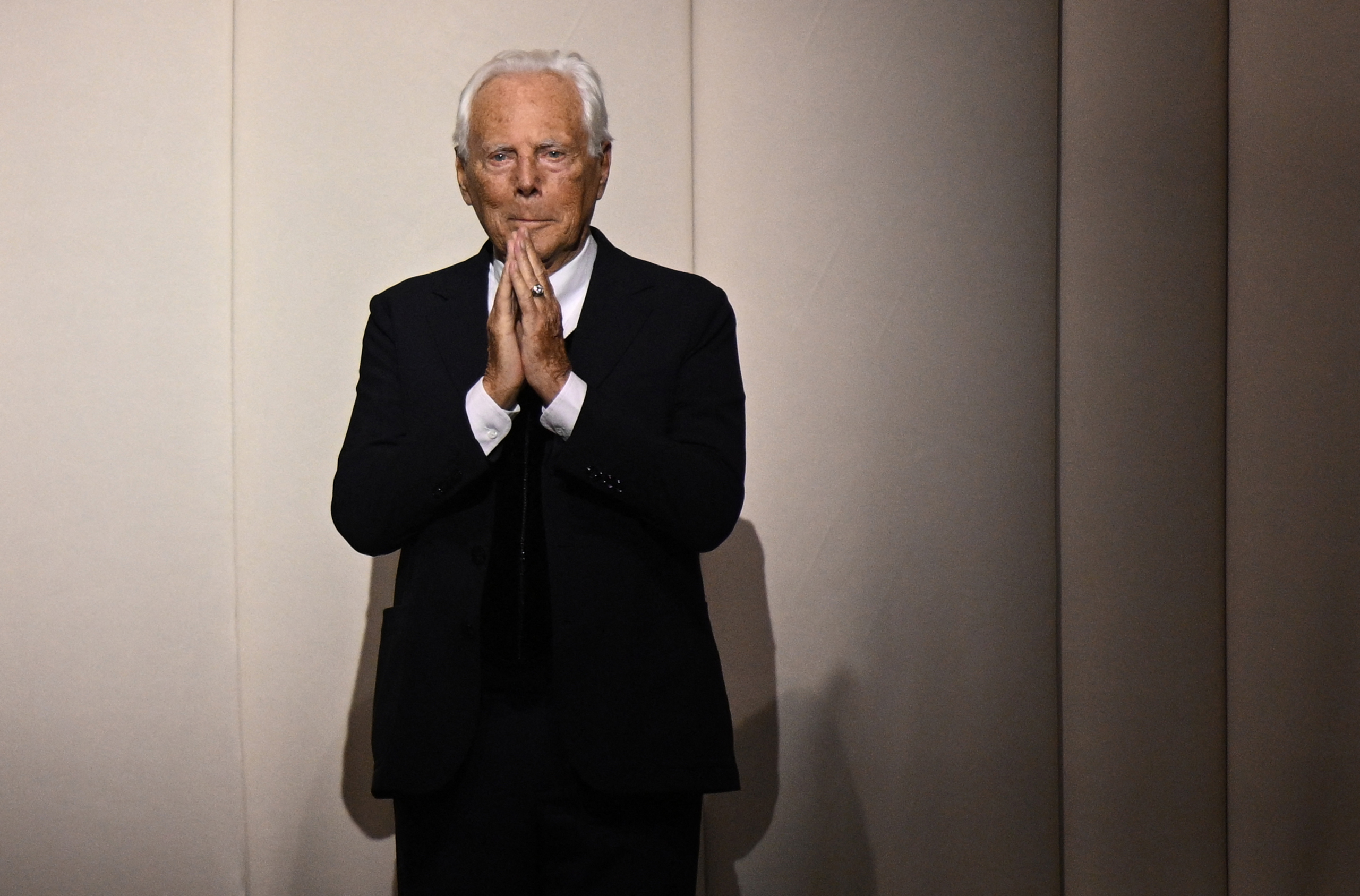The Italian fashion designer Giorgio Armani, who has died aged 91, was both globally renowned fashion royalty and beloved Italian cultural icon who leaves behind his eponymous fashion and lifestyle empire that is a worldwide byword for enduring Italian elegance.
Affectionately known as King Giorgio on account of his five-decade reign at the pinnacle of the luxury industry, Armani’s trailblazing trajectory had immediate impact when he launched the Giorgio Armani label in 1975 and leaves an indelible imprint on the world.
Legendary for his couture creations that graced every red carpet from the Oscars to Cannes Film Festival and adored by celebrities including Julia Roberts, Viola Davis, and brand ambassador Cate Blanchett, Armani’s biannual womenswear and menswear collections were met with consistent critical acclaim and commercial success.
“The only way to push boundaries is to keep looking at the world, at the evolutions of society, and act inventively,” he told the Observer in 2021. “Fashion, for me, is always a reflection, and at times also an anticipation, of the moment.”
His impact on menswear, in particular, was seminal. Having served as costume designer on American Gigolo in 1980, the soft-shouldered power suits worn by Richard Gere in the film became the defining silhouette of the decade and revolutionised how men dressed. The Armani menswear suit that Roberts opted to wear for the Golden Globe Awards in 1990 remains one of the most iconic red-carpet looks in Hollywood history.
The arrival of the Emporio Armani label in 1981 and the Armani Casa home interior brand in 2000 would later be major contributors to Armani’s household-name status. The former’s advertising campaigns featuring elite athletes such as David Beckham and Christiano Ronaldo modelling its underwear became legendary.
In all his collections, Armani stayed resolutely faithful to his singular aesthetic, insisting on timeless style statements over fleeting trends. In 2017 he told Harper’s Bazaar: “What has stayed the same is my desire to express myself. Because in this rapidly changing world, you can be influenced, dragged in one direction or another, and lose your own identity.”
In his later years, he frequently voiced his concerns that fashion was becoming an entertainment sport, rather than being appreciated for its ability to transform and empower.
“What worries me is the proliferation of ever-larger conglomerates and the transformation of fashion into a form of unrestrained or purely visual entertainment, where all that matters is being there and being seen at all costs,” he told the Observer in 2023.
Fashion wasn’t Armani’s first career path. Armani was born to Ugo Armani, an accountant, and Maria Raimondi in 1934 in the northern Italian town of Piacenza and prior to launching his brand, he pursued studies in science at the University of Milan which he left before graduation to join the Italian army in the early 1950s. From there, he returned to Milan and worked as a visual merchandiser for department store La Rinascente before securing a menswear design role at Nino Cerruti. In the late 1960s Armani met Sergio Galeotti, and together they set up Giorgio Armani Spa. Armani was 40 years old and famously sold his beloved white Volkswagen Beetle for start-up funds.
Newsletters
Choose the newsletters you want to receive
View more
For information about how The Observer protects your data, read our Privacy Policy
“The worst thing anyone has ever said to me [is] ‘You can’t,” he told the Observer in 2020. “I started my company with nothing but passion and the encouragement of my business partner Sergio Galeotti [who died in 1985]. He said, ‘Be yourself, believe in your vision, regardless of criticism. The results have been surprising. I would have loved to have shown him what became of what the two of us created. We started out so small.”
Remarkably, Armani remained sole shareholder of his eponymous brand until his death, making him one of very few fashion houses to remain free from external investment and influence. He also retained a tight grip on every area of his business, attending every fashion show up until March 2025.
His enduring influence made him the most celebrated Italian fashion designer of all time. In addition to multiple awards from governing fashion bodies including the CFDA, BFC and Camera della Moda, his most important accolades the Legion of Honour in 2008, the Compasso d'Oro Award in 2014 for lifetime achievement, and the Knight Grand Cross of the Order of Merit by the President of the Italian Republic in 2021.
Armani took immense pride in celebrating the history and promoting the skills of his native Italy. In 2020, Milan-based Armani was one of the first global brands to respond to the outbreak of Covid-19, donating 3 million euros to the Italian Government’s Civil Protection department and diverting its clothes production to make single-use hospital gowns, which were donated to healthcare facilities.
Armani is survived by his sister Rosanna Armani and nieces Silviana and Roberta, and his nephew Andrea Camerana. It is believed that the creative reins for his brand will be passed to Silviana (currently Head of Design) for womenswear and Leo Dell’Orco, a long-time collaborator, for menswear.
Photo: Bertrand Guay/AFP/Getty Images

